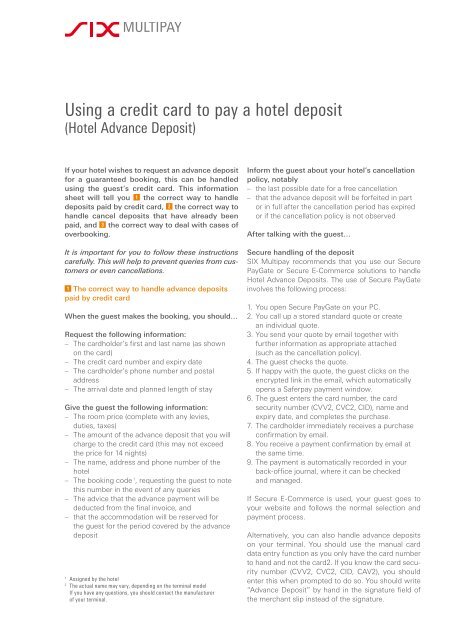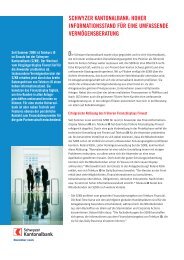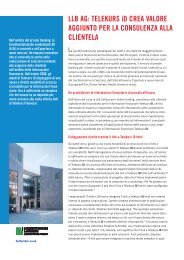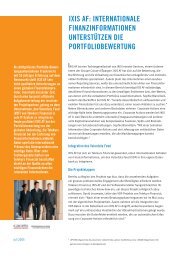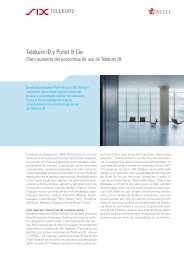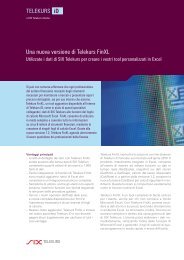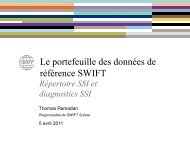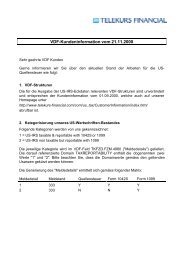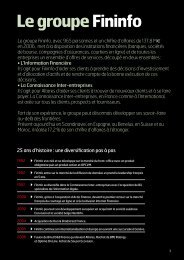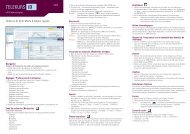Using a credit card to pay a hotel deposit - SIX Financial Information
Using a credit card to pay a hotel deposit - SIX Financial Information
Using a credit card to pay a hotel deposit - SIX Financial Information
You also want an ePaper? Increase the reach of your titles
YUMPU automatically turns print PDFs into web optimized ePapers that Google loves.
<strong>Using</strong> a <strong>credit</strong> <strong>card</strong> <strong>to</strong> <strong>pay</strong> a <strong>hotel</strong> <strong>deposit</strong><br />
(Hotel Advance Deposit)<br />
If your <strong>hotel</strong> wishes <strong>to</strong> request an advance <strong>deposit</strong><br />
for a guaranteed booking, this can be handled<br />
using the guest’s <strong>credit</strong> <strong>card</strong>. This information<br />
sheet will tell you 1 the correct way <strong>to</strong> handle<br />
<strong>deposit</strong>s paid by <strong>credit</strong> <strong>card</strong>, 2 the correct way <strong>to</strong><br />
handle cancel <strong>deposit</strong>s that have already been<br />
paid, and 3 the correct way <strong>to</strong> deal with cases of<br />
overbooking.<br />
It is important for you <strong>to</strong> follow these instructions<br />
carefully. This will help <strong>to</strong> prevent queries from cus<strong>to</strong>mers<br />
or even cancellations.<br />
1 The correct way <strong>to</strong> handle advance <strong>deposit</strong>s<br />
paid by <strong>credit</strong> <strong>card</strong><br />
When the guest makes the booking, you should…<br />
Request the following information:<br />
– The <strong>card</strong>holder’s first and last name (as shown<br />
on the <strong>card</strong>)<br />
– The <strong>credit</strong> <strong>card</strong> number and expiry date<br />
– The <strong>card</strong>holder’s phone number and postal<br />
address<br />
– The arrival date and planned length of stay<br />
Give the guest the following information:<br />
– The room price (complete with any levies,<br />
duties, taxes)<br />
– The amount of the advance <strong>deposit</strong> that you will<br />
charge <strong>to</strong> the <strong>credit</strong> <strong>card</strong> (this may not exceed<br />
the price for 14 nights)<br />
– The name, address and phone number of the<br />
<strong>hotel</strong><br />
– The booking code 1 , requesting the guest <strong>to</strong> note<br />
this number in the event of any queries<br />
– The advice that the advance <strong>pay</strong>ment will be<br />
deducted from the final invoice, and<br />
– that the accommodation will be reserved for<br />
the guest for the period covered by the advance<br />
<strong>deposit</strong><br />
1 Assigned by the <strong>hotel</strong><br />
2 The actual name may vary, depending on the terminal model<br />
If you have any questions, you should contact the manufacturer<br />
of your terminal.<br />
Inform the guest about your <strong>hotel</strong>’s cancellation<br />
policy, notably<br />
– the last possible date for a free cancellation<br />
– that the advance <strong>deposit</strong> will be forfeited in part<br />
or in full after the cancellation period has expired<br />
or if the cancellation policy is not observed<br />
After talking with the guest…<br />
Secure handling of the <strong>deposit</strong><br />
<strong>SIX</strong> Multi<strong>pay</strong> recommends that you use our Secure<br />
PayGate or Secure E-Commerce solutions <strong>to</strong> handle<br />
Hotel Advance Deposits. The use of Secure PayGate<br />
involves the following process:<br />
1. You open Secure PayGate on your PC.<br />
2. You call up a s<strong>to</strong>red standard quote or create<br />
an individual quote.<br />
3. You send your quote by email <strong>to</strong>gether with<br />
further information as appropriate attached<br />
(such as the cancellation policy).<br />
4. The guest checks the quote.<br />
5. If happy with the quote, the guest clicks on the<br />
encrypted link in the email, which au<strong>to</strong>matically<br />
opens a Safer<strong>pay</strong> <strong>pay</strong>ment window.<br />
6. The guest enters the <strong>card</strong> number, the <strong>card</strong><br />
security number (CVV2, CVC2, CID), name and<br />
expiry date, and completes the purchase.<br />
7. The <strong>card</strong>holder immediately receives a purchase<br />
confirmation by email.<br />
8. You receive a <strong>pay</strong>ment confirmation by email at<br />
the same time.<br />
9. The <strong>pay</strong>ment is au<strong>to</strong>matically recorded in your<br />
back-office journal, where it can be checked<br />
and managed.<br />
If Secure E-Commerce is used, your guest goes <strong>to</strong><br />
your website and follows the normal selection and<br />
<strong>pay</strong>ment process.<br />
Alternatively, you can also handle advance <strong>deposit</strong>s<br />
on your terminal. You should use the manual <strong>card</strong><br />
data entry function as you only have the <strong>card</strong> number<br />
<strong>to</strong> hand and not the <strong>card</strong>2. If you know the <strong>card</strong> security<br />
number (CVV2, CVC2, CID, CAV2), you should<br />
enter this when prompted <strong>to</strong> do so. You should write<br />
“Advance Deposit” by hand in the signature field of<br />
the merchant slip instead of the signature.
1110.10953/07.2010<br />
Please note that using manual <strong>card</strong> data entry <strong>to</strong> handle<br />
transactions entails risks that are assumed by you,<br />
the merchant. This is notably the case when it<br />
becomes clear after the event that the <strong>card</strong> data was<br />
used fraudulently without the approval of the <strong>card</strong>holder.<br />
In such cases, you bear the full risk for collecting<br />
the amount owed by the <strong>card</strong>holder for the transaction<br />
in question. You can considerably reduce this<br />
risk by using Secure PayGate.<br />
Compliance with PCI DSS<br />
You should retain the <strong>card</strong> data in physical form and avoid s<strong>to</strong>ring it on<br />
a computer system. If you wish <strong>to</strong> s<strong>to</strong>re <strong>card</strong> data electronically, you need<br />
<strong>to</strong> be certified compliant with PCI DSS. To find our more, please refer <strong>to</strong><br />
our instructions for merchants concerning compliance with the PCI DSS<br />
security regulations. You should keep the <strong>card</strong> data recorded manually<br />
(<strong>card</strong> number and expiry date) in a secure place that is only accessible <strong>to</strong><br />
a limited group of people. This <strong>card</strong> data must be destroyed once the<br />
guest has left the <strong>hotel</strong>. Card security numbers (CVV2, CVC2, CID, CAV2)<br />
must never be s<strong>to</strong>red.<br />
Provide the guest with written notification<br />
of the <strong>deposit</strong><br />
You are obliged <strong>to</strong> send a written confirmation of the<br />
<strong>deposit</strong> <strong>to</strong> the guest <strong>to</strong>gether with a copy of the reservation<br />
slip within three working days.<br />
Your <strong>hotel</strong>’s <strong>deposit</strong> confirmation must include the<br />
following information 3 :<br />
– Name of the <strong>hotel</strong><br />
– Name, invoice address and phone number of the<br />
<strong>card</strong>holder<br />
– Expected arrival date<br />
– Amount of the <strong>deposit</strong><br />
– Transaction date<br />
– Deposit booking code<br />
– Latest cancellation date<br />
– Cancellation policy as agreed with the guest<br />
– <strong>Information</strong> about rights and obligations when<br />
advance <strong>deposit</strong>s are paid by <strong>credit</strong> <strong>card</strong><br />
You must obtain written confirmation of the booking<br />
from the <strong>card</strong>holder (by fax, letter or email). The <strong>card</strong>holder<br />
must explicitly confirm having read, unders<strong>to</strong>od<br />
and accepted the cancellation policy. We recommend<br />
that you send a standard letter for the<br />
<strong>card</strong>holder <strong>to</strong> sign and return.<br />
<strong>SIX</strong> Multi<strong>pay</strong> Ltd www.six-multi<strong>pay</strong>.com<br />
Hardturmstrasse 201<br />
P. O. Box<br />
CH-8021 Zurich<br />
2 The correct way <strong>to</strong> cancel advance <strong>deposit</strong>s<br />
When talking with the <strong>card</strong>holder<br />
– Notify him of his cancellation code 4 .<br />
– Request him <strong>to</strong> note this code for use in the event<br />
of any queries.<br />
After the conversation<br />
– Write “cancelled” and the cancellation code on<br />
the advance <strong>deposit</strong> confirmation.<br />
– Calculate the amount <strong>to</strong> be refunded.<br />
– Carry out a <strong>credit</strong> <strong>card</strong> refund at your <strong>credit</strong> <strong>card</strong><br />
terminal.<br />
– Send a copy of both slips (Advance Deposit<br />
booking slip and cancellation <strong>credit</strong> slip) <strong>to</strong> the<br />
guest within three working days by letter /fax<br />
or email <strong>to</strong>gether with a note explaining that a<br />
refund has been made.<br />
Refunds may only be initiated on the same <strong>credit</strong><br />
<strong>card</strong> that was originally debited. No other <strong>credit</strong><br />
or debit <strong>card</strong>s, no bank transfers.<br />
3 The correct way <strong>to</strong> deal with overbooking<br />
The guest essentially has a right <strong>to</strong> the booked room<br />
or room category. If the accommodation booked by<br />
the guest is not available upon arrival, you are obliged<br />
<strong>to</strong> offer him the following services in lieu at the least:<br />
– Accommodation in a different <strong>hotel</strong> until the<br />
reserved room is available. This must be of at least<br />
the same quality or higher.<br />
– Transfer <strong>to</strong> the substitute <strong>hotel</strong> and back<br />
(on a daily basis, if requested by the cus<strong>to</strong>mer)<br />
– Forwarding of all incoming messages and calls<br />
<strong>to</strong> the substitute <strong>hotel</strong><br />
– Two free, three-minute phone calls<br />
– Where the guest either accepts the substitute<br />
<strong>hotel</strong> but <strong>pay</strong>s for it personally or rejects the substitute<br />
<strong>hotel</strong>, you are required <strong>to</strong> <strong>credit</strong> the full<br />
amount of the advance <strong>deposit</strong> paid <strong>to</strong> the guest 5 .<br />
3 Your <strong>hotel</strong> writes the confirmation of the advance <strong>deposit</strong><br />
4 Your <strong>hotel</strong> assigns the cancellation code<br />
5 For procedure, see 2: The correct way <strong>to</strong> cancel advance <strong>deposit</strong>s


